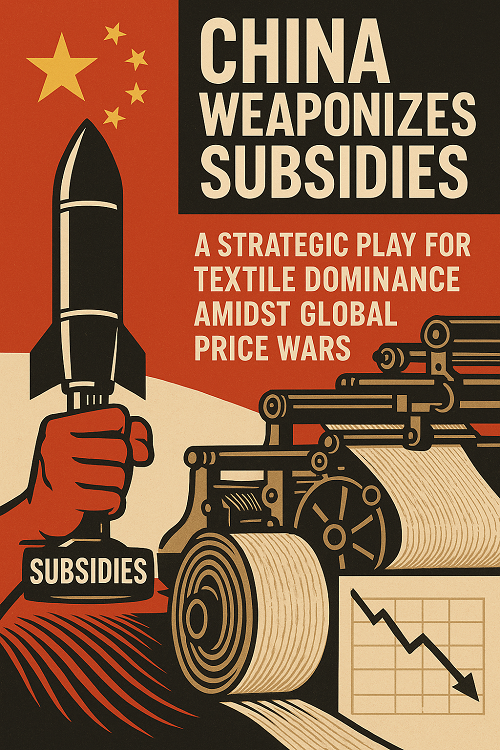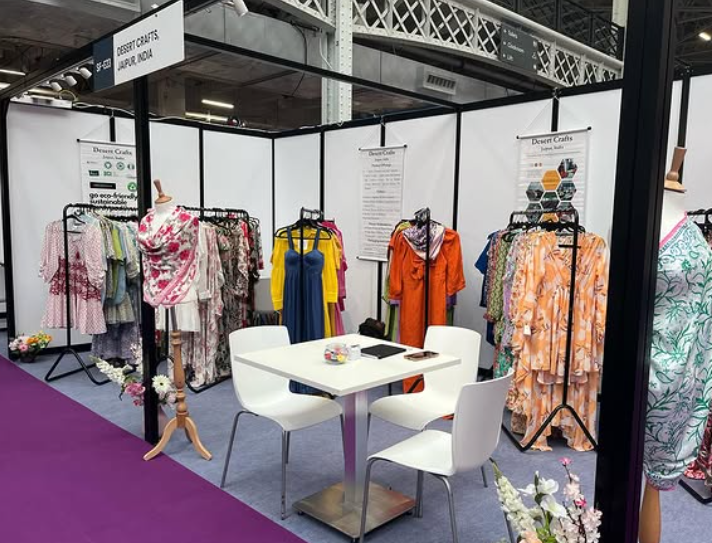Jeanologia, a pioneering Spanish company specializing in eco-efficient technologies, is set to revolutionize the textile industry at Kingpins Amsterdam, taking place from October 18-19 in SugarCity, Amsterdam. The firm will unveil its cutting-edge innovations that promise to usher in a new era of air-powered and highly efficient textile production, underpinned by automation and digitization.
The company's visionary approach signifies the end of the water era in textile processing, with a focus on harnessing the power of air. Jeanologia's atmospheric washing process, Atmos, allows for the creation of authentic vintage garments without the use of water, pumice stones, or chemicals. It's a game-changer that offers both sustainable production and the preservation of traditional denim aesthetics.
Jeanologia's G2 ozone technology is another breakthrough, dramatically reducing water and chemical consumption in denim and knitwear production. The system achieves a natural wear tone more quickly and cost-effectively, all while reducing environmental impact.
With the Atmos process and G2 ozone technology, the textile industry can dry-finish jeans with an authentic vintage look, eliminating traditional polluting processes and increasing sustainability. This innovation, a part of the "Washed by the atmosphere ecosystem," not only benefits textile companies' profitability but also contributes to greater sustainability in the textile finishing industry.
For over 25 years, Jeanologia has been on a mission to transform the textile industry into an ethical, sustainable, and eco-efficient field. Its range of disruptive technologies has garnered the trust of major brands, with over 35% of jeans produced globally using their solutions.
Jeanologia's dedication to sustainability, digitalization, and automation is set to reshape the industry, proving that the future of textiles lies in the power of air and eco-conscious technologies.
Advance Denim, Grace, and CIRCULOSE® have joined forces to launch a new denim collection featuring Gracell® x CIRCULOSE® viscose made with a 50% blend of CIRCULOSE® pulp. This is a significant milestone in the denim industry, as it is the first time that such a high-CIRCULOSE® content viscose fiber has been used in denim manufacturing.
The collection features two fabrics constructed from an innovative blend of cotton, Gracell® x CIRCULOSE® viscose, recycled cotton, Ecovero, spandex, T400, and LYCRA®. These fabrics offer superior comfort, performance, and sustainability.
This collaboration is a testament to the commitment of Advance Denim, Grace, and CIRCULOSE® to accelerate textile circularity.
Advance Denim has a rich history of championing sustainable practices in the denim industry, while Grace is a leader in the production of viscose with a higher CIRCULOSE® blend. CIRCULOSE® is a branded dissolving pulp created by Renewcell that is made from 100% recycled textiles.
The Advance Denim capsule collection will be showcased at Kingpins Amsterdam on October 18 and 19, 2023.
Apparel Group, a globally acclaimed fashion and lifestyle retail conglomerate, has once again made headline-worthy strides in the Middle East and India. In addition to launching 49 new stores across the region during August and September, the company has celebrated numerous significant partnerships, milestones, and accolades.
Store Launches & Highlights
7 Beverly Hills Polo Club stores commenced operations in several key markets, including Sharjah, UAE, Jeddah, Jizan in KSA, Kuwait, and Ranchi, Kochi, and Pune, in India.
24 leading brands, such as Calvin Klein, Crocs, Aeropostale, Forest Essentials, Havaianas, Levi's, R&B, Rituals, Steve Madden, Inglot, Skechers, Birkenstock, Tommy Hilfiger, Dune London, and Coldstone Creamery, expanded their footprint in premium locales in the Middle East and India.
September featured the emergence of 4 brands, including Bath & Body Works, ALDO Accessories, Inglot, and Beverly Hills Polo Club in Pune's Phoenix Mall of the Millennium, India.
Tim Hortons celebrated the launch of its 300th store across GCC and India, continuing to brew delightful experiences for its customers.
Babies & More made its grand debut at The Warehouse, Kuwait, solidifying Apparel Group's commitment to offering holistic solutions to consumers, including new parents.
Pivotal Strategic Collaborations
Apparel Group penned an exclusive deal with Firehouse Subs, aiming to roll out over 100 restaurants across UAE and Oman in the next decade.
The group sealed a multi-brand agreement with Marquee Brands, integrating brands like BCBG, Ben Sherman, Bruno Magli, Sur la table, and Martha Stewart within its portfolio across the GCC and India.
Apparel Group formed a joint venture with the distinguished womenswear brand, Forever New, promising a unique blend of global fashion insights tailored to local preferences.
MAS Matrix, the diversified flat-knit apparel manufacturing facility under MAS Holdings, announced the launch of its latest product platform, 'MVTM.' MVTM is a new athleisure platform that offers a range of highly functional, versatile, and fashion-forward designs, meticulously engineered to offer freedom of movement and with unique zonal support.
The MVTM collection is also committed to sustainability, with 77% of the collection composed of recycled post-consumer waste or natural and regenerative fibers. These include recycled polyester, organic, Better Cotton Initiative-certified cotton, and bio-based fabrics like modal, Tencel, and hemp.
The launch of MVTM is a testament to MAS Matrix's unwavering commitment to innovation, sustainability, and providing consumers with apparel that seamlessly adapts to their dynamic lifestyles.
Key points
MVTM is a new athleisure platform from MAS Matrix that offers a range of highly functional, versatile, and fashion-forward designs.
MVTM products are meticulously engineered to offer freedom of movement and with unique zonal support.
The MVTM collection is committed to sustainability, with 77% of the collection composed of recycled post-consumer waste or natural and regenerative fibers.
The launch of MVTM is a testament to MAS Matrix's unwavering commitment to innovation, sustainability, and providing consumers with apparel that seamlessly adapts to their dynamic lifestyles.
OETI, a member of TESTEX Group, is a ZDHC Approved Solution Provider under the ZDHC Roadmap to Zero Programme, which aims to eliminate hazardous chemicals from the textile and leather sectors.
OETI is also a ZDHC Approved MRSL Certification Body for OEKO-TEX ® ECO PASSPORT worldwide.
OETI India has launched the ‘ZDHC CMS Framework Training for Suppliers’, which teaches how to implement chemical management systems (CMS) in accordance with ZDHC standards. The training targets different departments within the organisations, such as management, chemical teams, procurement, compliance, and sustainability.
OETI India’s country manager, Vignesh Amalraj, says: ‘We want to demonstrate the collaboration among these departments to achieve ZDHC alignment, as required by brands and consumers.’
OETI India is conducting training sessions in Tirupur, Delhi, Bangalore, and Ahmedabad in the next few months. OETI also offers customised training for specific facilities or clusters based on their needs and processes.

As digital technologies and platforms become increasingly important in addressing global challenges, the textile industry is taking on many new forms in the automation, data analytics, and supply chain management segment to reduce costs and improve the overall product quality and customer experience. Whether it is energy conservation or waste management, rapid digitalization made age-old industry practices far more sophisticated and prompted faster implementation across various operations. With e-commerce emerging strong in post-Covid years catering quickly to changing customer preferences, the need for more sustainable production and consumption is driving forward rapid digitalization in this segment.
CAD, RFID help automation, waste reduction
Increased productivity and more sophisticated manufacturing processes have been advantageous in incorporating digital technology in which in turn has helped in reducing wastage and reusing raw materials. This has further helped in minimizing the need for power resources such as electricity, water, and energy and creating a greener and cleaner environment.
Digitization processes such as Computer-Aided design (CAD) technology that helps create sophisticated patterns faster while allowing a range of design modifications have drastically reduced industrial wastage. Other digitization forms such as Radio Frequency Identification (RFID) technology helps track the movement of textile rolls for efficient material handling and many other new processes in automation, data analytics, and supply chain management are all being incorporated into the textile industry.
Digitalization driving fashion segment
A recent report by Deloitte's Global Fashion & Luxury Private Equity and Investors Survey 2023, highlighted the fashion and luxury segment has and will continue to be a lucrative one for most global investors and financial operators. This is due to many positive factors such as more predictable and mapped consumer behavior and the difficulty issues of high energy costs and raw material prices and supply chain disruptions having becoming far more manageable.
The growth drivers of the apparel segment have been the personal luxury goods sector. A lot of this growth can be attributed to the rapid digitization across the apparel, accessories, and textile segments.
Other industry global reports on the key prospects offered by digitalization have focused on sustainability which can together attain more Sustainable Development Goals (SDG) set for 2030 by the United Nations as a global call to action to end poverty and protect the planet from environmental damage.
As Brij Mohan Sharma, Managing Director, RSWM, one of the largest textile manufacturers in India and exports points out, the fourth Industrial Revolution, driven by digitalization, is reshaping economies through digital innovation across sectors. Embracing it is no longer a choice but a necessity in current times, to gain a competitive edge in the market and can help companies position themselves at the forefront of progress by navigating the complexities of modern markets.
Brands across the board have realized to keep up with technological innovation and new computer languages, an increasing digital presence is a necessity and not just an option. It is time textile businesses include digitization to make more responsibly manufactured products and lower global pollution for more streamlined operations with sustainability and durability as its core issues.
Textile Exports Up 11.06% YoY, Apparel Exports Down 11.23% YoY in September 2023
Cumulative Textile and Apparel Exports Up 1.77% YoY, Down 24.62% YoY in September 2023
Indian Textile and Apparel Exports Down in April-September 2023
Report
The Confederation of Indian Textile Industry (CITI) has released its analysis of exports and imports of Textiles and Apparel (T&A) for September 2023.
Key Findings:
Textile exports registered a growth of 11.06% over the previous year in September 2023, while apparel exports registered a degrowth of -11.23% during the same time period.
However, as compared to September 2021, exports of both textile and apparel have declined by -23.02% and -27.27% respectively.
Cumulative exports of textiles and apparel during September 2023 have registered a growth of 1.77% over September 2022, while it has declined by about -24.62% as compared to September 2021.
During April-September 2023, Indian textiles exports registered a degrowth of -3.59% over the previous year, while apparel exports registered a degrowth of -15.36% during the same time period.
Similarly, as compared to April-September 2021, the exports of textile and apparel have declined by 18.37% and 5.69% respectively.
Cumulative exports of textiles and apparel during April-September 2023 have registered a degrowth of -8.81% as compared to April-September 2022, while the same has declined by about -13.59% as compared to April-September 2021.
The decline in textile and apparel exports in September 2023 and April-September 2023 is a matter of concern for the Indian textile industry. The industry is facing a number of challenges, including rising input costs, global economic slowdown, and supply chain disruptions.
The government and the industry need to work together to address these challenges and support the growth of the textile and apparel industry.
Pure London x JATC, The London Festival of Fashion, will take place on February 11-13, 2024 at Olympia London. The show has revealed an inspirational line-up of brands across the newly expanded Woman, POP, and Sustainable destinations.
Woman
Mirayama: A London-based conscious luxury couture brand that celebrates traditional Indian craftsmanship. The collection is characterized by fluid shapes in timeless designs.
Sugarhill Brighton: A renowned brand for its colorful, vibrant, and hand-drawn exclusive prints.
Other returning brands in the Woman destination include GWD by George Davies, La Fee Maraboutee, Lily & Me, and Humility.
POP
Formerly Known As: A gender-neutral brand that creates classic elevated pieces for everybody and every body.
Pheme Paris: A Parisienne ready-to-wear brand with a collection that highlights lines, graceful shapes, and refined details.
Other returning brands in the POP destination include Heretic Nine.
Sustainable
Isabelle Pennington Edmead: A brand for the conscience with zero wastage and zero guilt. The collection celebrates prints, with all fabrics sourced ethically and printed in the UK.
Meta Vocus: An activism-focused fashion brand that originated from a desire to raise awareness about complex societal and environmental issues. The wearable art collection explores these themes with beautiful painted prints on sustainable scarves.
A report by FICCI-Wazir Advisors titled “Textile Industry’s Amrit Kaal: Roadmap for US$ 350 Billion Market by 2030” was released at the FICCI TAG 2023 Annual Textile Conference. The report outlines the global trends, market scenario, and opportunities for India in the textile and apparel sector. It also suggests the key initiatives that India needs to take to reach the US$ 350 billion target by 2030.
According to the report, the Indian textile and apparel market size is expected to grow from US$ 165 billion in 2022 to US$ 350 billion by 2030, with a 10% CAGR. The domestic market will account for US$ 125 billion and exports will contribute US$ 40 billion in 2022.
The report identifies the key enablers for achieving the target as:
Export competitiveness
Manufacturing excellence
Textile value chain strengthening
Sustainable practices and circular economy
Government schemes
The report also recommends that the industry should focus on automation, digitalization, skill development, FTAs, synthetic textiles, technical textiles, and global best practices. The government should support the existing clusters and ensure quality and compliance.
ITME Africa & Middle East 2023, a textile and textile engineering event, will be held in Nairobi, Kenya from November 30 to December 2, 2023. The event is expected to promote joint venture and business cooperation for textile and machine manufacturers. It will also showcase the latest textile technology and innovations, and explore the potential of Kenya as a new business destination.
The event is being organized by India ITME Society, a non-profit apex industry body. It has been conceived with the vision to initiate a new era towards self-reliance, socio-economic advancement, and empowerment in the textile and textile engineering sector with international cooperation for Africa and the Middle East.
The event will feature over 23 participating countries from Africa, Asia, Europe, and North America. It is expected to attract over 10,000 visitors from the textile and textile engineering industry.
The event will focus on new chapters such as cotton seed and cotton farming technology and equipment, machinery related to engineering products, home textile products, associated goods and services for textile industry, and technical information services, educational research institutes, and COEs.
At the curtain raiser event, the Guest of Honor, H.E. Shri Rohit Vadhwana, Deputy High Commissioner & DPR (UNEP & UN-HABITAT), High Commission of India, Nairobi, said, "This Exhibition is a significant stride towards enhancing bilateral trade and promoting industrial cooperation between India & Kenya. This landmark partnership aims to harness the strengths of both nations and drive innovation, sustainability, and economic growth in the Textile Technology & Engineering sector."
The Chief Guest, H.E. Dr. Juma Mukwana, Principal Secretary, State Department for Industry, Republic of Kenya, stated, "ITME Africa & Middle East 2023 hosted in Kenya shall draw more attention to the potential of the Kenyan textile industry and raise awareness about their products and capabilities, both domestically and internationally. This can lead to increased visibility and potential business inquiries and open doors for Kenyan businesses to expand their customer base."
- 1
- 2
- 3
- 4
- 5
- 6
- 7
- 8
- 9
- 10
China Weaponizes Subsidies: A strategic play for textile dominance amidst global…
Despite the narrative of a global apparel pivot away from China, the reality on the ground paints a different picture.... Read more
Shift in fashion's value proposition, can speed and sustainability coexist?
Expanding on the recent LinkedIn post by Lubomila Jordanova, CEO & Founder of Plan A and Co-Founder of Greentech Alliance,... Read more
Gartex Texprocess India 2025 kicks off in Mumbai with global focus
The 2025 Mumbai edition of Gartex Texprocess India opened its doors at the Jio World Convention Centre on May 22,... Read more
EU Horizon T-REX project data reveals challenges for textile-to-textile recyclin…
A new report from the EU Horizon T-REX (Textile Recycling Excellence) Project, while focused on piloting a data model to... Read more
Source Fashion to showcase global ethical sourcing solutions in July 2025 editio…
Source Fashion, the UK’s leading responsible sourcing show, is set to return from 8-10 July 2025 at The Grand Hall,... Read more
CHIC September 2025 to return in Shanghai with ‘Fashion Picnic’ theme
China’s leading fashion trade event, CHIC 2025 (September), will return to the National Exhibition and Convention Center in Shanghai from... Read more
US consumer confidence dips amidst economic uncertainty
In April 2025, the US consumer sentiment recorded a shift as confidence levels dipped, indicating potential headwinds for the economy.... Read more
Secondhand on the rise in Europe as it readies for a €26 bn fashion revolution b…
Across Europe, pre-owned garments are shedding their ‘used’ label and stepping into the spotlight as a mainstream force. A new... Read more
India-Bangladesh Trade in Turmoil: Retaliatory measures threaten regional commer…
The burgeoning trade relationship between India and Bangladesh has hit a turbulent patch, marked by a series of retaliatory trade... Read more
Peeling Back the Fabric: Glimpact study gives true ecological threads of apparel…
A groundbreaking new study by Glimpact, has pulled back the curtain on the often-obscured environmental footprint of the apparel industry,... Read more












